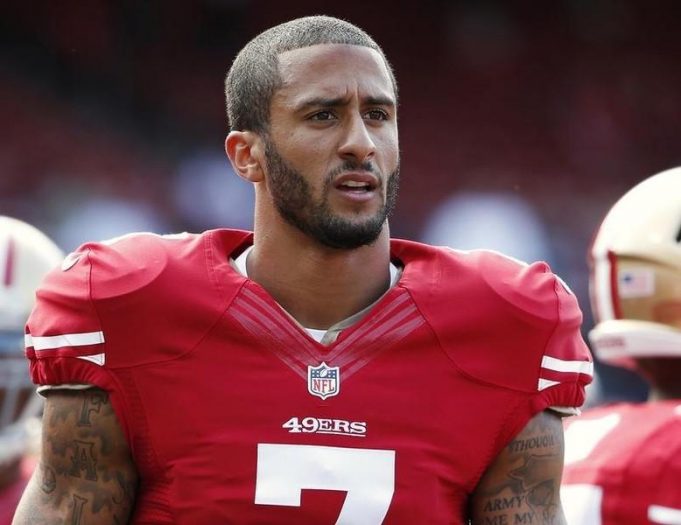Over the past few week, the US news media and blogosphere have been flooded by the news that San Francisco 49er quarterback Colin Kaepernick refused to stand for the national anthem AND that his refusal was linked to his strong feelings about the way black people continue to live under oppression in this society — specifically police brutality. Reaction to Kaepernick was swift and brutal. To be fair, “Kaep” has had his supporters but rarely do his critics address the context and bigger picture Kaepernick is attempting to expose.
One question that has surfaced is “Why is he doing this? He’s a football player he should just play ball.” That kind of thinking reflects the “minstrelsy” we demand of the black body. Just entertain us. Do not think. Do not speak … unless you are speaking to tell us how grateful you are to be here and how thankful you are to please us. The main reason I believe Kaepernick is protesting the anthem (and by proxy the nation) is because no one will listen to a retail store clerk (or any other no name citizen)! And, to his credit, Kaepernick has pledged $1 million to helping organizations fighting racial injustice.
Using celebrity to advance a cause (particularly an “unpopular” cause) is not a new thing. Artists like Jane Fonda, Marlon Brando, and Bono have stood before the world for causes they believe in. Black athletes have treaded an unsure road because they do not have the protection of whiteness or wealth (yes, they have income but rarely money to pass along inter-generationally) to fall back on. Paul Robeson lost almost everything for being willing to stand up against US oppression. His passport was lifted (and he made his living singing around the world). Rutgers removed him from its athletic hall of fame (despite being an outstanding football player). There were venues in the US that would not permit him to perform in them. The all-American icon, Jackie Robinson wrote in his autobiography in 1972, “Today, as I look back on that opening game of my first World Series, I must tell you that it was Mr. Rickey’s drama and that I was only a principal actor. As I write this 20 years later, I cannot stand and sing the anthem. I cannot salute the flag; (emphasis added) I know that I am a black man in a white world. In 1972, in 1947, at my birth in 1919, I know that I never had it made.”

Perhaps the most memorable athletes’ protest against the US came at the 1968 Mexico Olympics when Tommie Smith and John Carlos stood upon the medal stand bowed their heads and raised black-gloved fists as the anthem was played. At that moment, everyone forgot that Smith had run a record-breaking 200-meter race. They were largely ostracized for their stance and it was not until the 21st century that people recognized their courage and the rightness of their position. In 2008, both men were awarded the Arthur Ashe Courage Award at the ESPYs.
Of course, we cannot forget the courage of Muhammad Ali who refused to participate in the Vietnam War. Because of it, he lost his livelihood. He could not box and the 3-plus years he lost were in the prime of his career. Today, we celebrate Ali as “The Greatest” but minimize the way he was punished for taking a principled stand. In each of these cases, the media has trotted out black “surrogates” to speak against the black athletes.
Athletes are as human as anyone else. What is interesting is how quickly the powers that be are to forgive drug addicts, rapists, batterers, “serial daddies” (as in men who have multiple “baby mamas” without paying child support) and others. But let someone stand up and point out racism and inequity and we decide that she or he is not worthy of citizenship. Kaepernick is demonstrating what is allegedly the greatness of democracy — that you can hold and express opinions different from others. The “my country — love it or leave it” crowd are dangerous to civil society. Their lack of criticality is what has landed us in this particular presidential election cycle.
For those who argue that “there is another way to do it,” I will remind you that Milwaukee has been languishing with a lack of adequate jobs and education opportunities. Black people are paying taxes and voting just like white people. But who wants to pay for people to ignore, demonize, and brutalize them?
When the Sherman Park community erupted in civil disobedience a few weeks ago, the governor and his people decided it was time to infuse some money into Milwaukee and create some jobs. So, “the other way” rarely produced results. Unfortunately, it takes people’s willingness to “get mad” and “tear some stuff up” to get attention. And sometimes it takes simply refusing to stand to show your righteous indignation to injustice.










